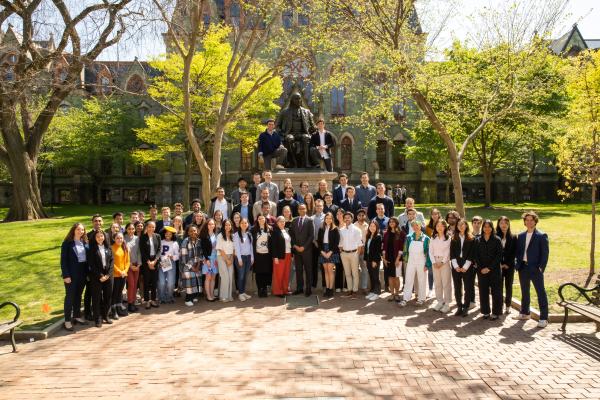CURF supports faculty as they mentor and advise undergraduate researchers and fellowships applicants.
Get involved with CURF!

Fund Research with Undergraduates
There are many different ways to support and compensate your undergraduate researchers.
Find the right funding for your project
Meet, Mentor, and Teach Undergraduates
We help students find faculty--and faculty find students.
Find an undergraduate research assistant
Identify and Support Future Fellowship Applicants
Faculty get to know Penn students as fellow scholars--we rely on your insights to help us find and prepare the next fellowships applicants.
Learn how to refer students to us!Please contact us if you would like to have a representative from CURF visit your class. We can tailor our information and materials to your students’ needs and levels of experience, such as:
- Undergraduate Research at Penn: An Overview
What is undergraduate research? Why participate? How do I get started? What are the funding resources available to me? - Steps to Getting Involved in Undergraduate Research
Information about campus undergraduate research resources, identifying and contacting faculty, and faculty expectations. - Fellowships 101
What are fellowships and how can I prepare myself to be a competitive applicant? - Fellowships 201
What makes a strong candidate for a fellowship?
Student research with faculty members is an integral part of the student experience at the University of Pennsylvania. Undergraduates bring enthusiasm and fresh ideas to the research process and are important contributors to the intellectual community. Some students seek out faculty to provide guidance for their independent research or creative projects while others can provide valuable assistance to faculty research projects. The ways in which students are involved in the research process will depend on the discipline, project and needs of the faculty member.
With support, training, and guidance, undergraduates can contribute by:
- collecting, compiling, entering and analyzing data
- recruiting, scheduling and running study participants
- conducting archival or library research and writing literature reviews
- transcribing and coding or analyzing interviews
We can help! Please complete this form. The information will be posted in our Research Directory so that students can learn more about your work and contact you about available positions.
Contact our office! We can help both you and the student determine which research grant or fellowship would best fit their interests and needs. In addition, a number of applications require statements of support from faculty members who will be advising students on their projects. Discussing the details of students’ proposed projects will make their applications even stronger.
Faculty supervise and direct student research, offering insight, feedback and recommendations. Faculty also challenge, nurture and shepherd young researchers into possible future careers. While involving undergraduate students in your research can be very rewarding to both you and students, it does take work! When embarking on a project with an undergraduate research, faculty may want to:
- Clearly establish expectations and devise a work plan-- if desired, a “contract” can help prevent misunderstandings
- Orient students to resources and processes
- Establish a mode for regular communication (e.g., weekly meetings, monthly progress reports, conference calls).
- Encourage students to ask questions and share ideas
- Emphasize documentation of research
- Discuss intellectual property issues or authorship expectations
- Encourage students to present their research
- Facilitate the process of the students receiving academic credit
- Encourage the student to publish their contributions
Students can register for an independent study to receive academic credit for their research. The procedures are governed individually by each undergraduate school.
Penn undergraduates are expected to become familiar with the ethical standards in their discipline and to conduct their research with the highest level of integrity. While the individual training necessary to maintain excellence will vary by field and is overseen by Penn’s Institutional Review Board (IRB), CURF provides these general guidelines and resources for Penn undergraduates.
Fellowship applicants should abide by the fundamental ethical principles outlined on our site throughout the application development process
Like all strong recommendation letters, fellowship recommendations should be detailed, specific, and explain why the applicant will succeed as a fellow and how s/he meets the application criteria. Applicants should provide you with detailed information. More information can be found here.
There are many similarities, but fellowship foundations emphasize that recommendations should illustrate that the writer knows why the applicant is applying for a specific opportunity, and can describe why they believe the applicant will succeed. More information on this process here.
Presidential Prize mentors agree to mentor an applicant(s) for the President’s Engagement Prize during the preparation of their prize proposal. This includes advising the student(s) on the design of the project and preparation of the initial proposal during the Fall of their senior year. If the proposal is selected for the Prize, during the spring semester mentors and recipients will work together to develop a detailed plan for project implementation, finalize the project budget, obtain any necessary third-party commitments, make any necessary preparatory arrangements, and refer the student(s) to other individuals and resources as needed in developing their project. Presidential Prize mentors may — but are not required to — continue to mentor recipient(s) of the Presidential Prize during the project implementation year (i.e., the year immediately following their graduation from Penn). The time commitment varies, but is most intense as the student finalizes the proposal in late fall and prepares to launch the project in the spring and early summer.
Standing faculty who wish to serve on Penn’s Fellowships Faculty Review Committee are asked to contact Michaile Rainey.